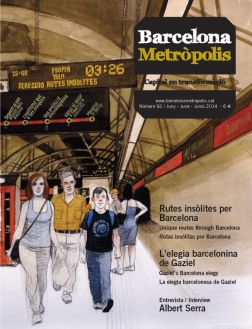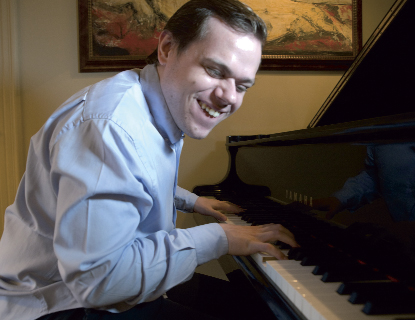Closing our eyes is a reflex action that we find ourselves doing when we hear good music because, unconsciously, we want to enhance our sense of hearing. Ignasi Cambra’s blindness has brought him closer to the keys and has given him a temperamental character that has been seen in venues throughout Catalonia, Spain, Russia, Japan and the United States, where he trained seven years ago.
He began his career alongside Maria Lluïsa Alegre, at the Escola de Música de Barcelona. Later he took classes with Albert Attenelle and when he was seventeen and eighteen he went to Indiana to do a summer course and was offered a place at the Jacobs School of Music, Bloomington University, where he studied for a Bachelor’s degree in piano and, at the same time, studied Business Administration at the Kelly School.
He then spent two years studying under the tutelage of Alexander Toradze in South Bend, a programme for just six students that introduced him to Valery Gergiev. And from the cold and solitude of South Bend, where he would often see the Amish carts passing by, he travelled to the cultural epicentre of the United States to enrol in what is considered to be the best music school in the world, the Julliard School of performing arts in New York, where he is currently studying for a Master’s degree.
Cambra believes he has now reached a very interesting point in his career, in which he is presented with an increasing number of professional challenges that require rapid changes in repertoire. Recently he has been in residence at La Pedrera and has performed at the Auditori with Valery Gergiev; and, he says, he is getting used to the fast pace. This is the only handicap of his blindness, as he only has two possible ways of studying, either using Braille or following one of the recordings that are often provided for him by his teacher Maria Lluïsa Alegre, or another of his colleagues. Braille music is slow to read, as it entails a very linear way of writing that makes full vertical perception difficult and makes it hard to interpret the movement of harmonies.
Although he used to take part in competitions when he was younger, Cambra is critical of the competitions that, recently, and due to the Asian influence, have introduced perfection into the judging criteria. Cambra believes there are two types of pianist, those that prioritise tidiness, such as Evgeny Kissin, and those that go for maximum expressiveness, such as Giorgy Sokolov. He includes himself in the second category.




